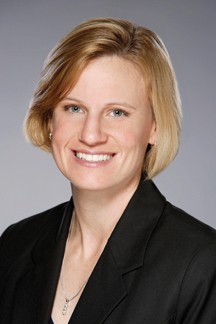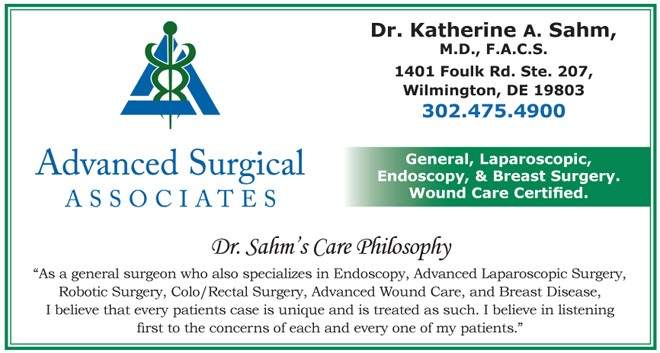Keeping You Informed: Reasons For A Screening Colonoscopy

By Dr. Katherine A. Sahm, M.D., F.A.C.S.
The early warning signs of colon cancer: You feel great. You have a healthy appetite. You are only 50. Among cancers that affect both men and women, colorectal cancer is the second leading cancer killer in the United States. But if everyone ages 50 or older had regular screening tests, at least 60% of deaths from this cancer could be avoided.
Starting at age 50, for persons with average risk, the American Cancer Society recommends a colonoscopy every 10 years. A colonoscopy can prevent 76% to 90% of colon cancers.
The lifetime risk of developing colorectal cancer is about 1 in 19 (5.4%). The risk is slightly higher for men. The risk for colon cancer is increased if you have: Ulcerative Colitis, Crohn’s Disease, or a mother, father, or sibling with colorectal cancer.
Most colorectal cancers start as a non-cancerous polyp (fast growing cells that line the inside of the colon and may become cancer). A screening colonoscopy can find such polyps and often the polyps can be removed before they develop into cancer. If cancer is already present, finding it early, before it causes symptoms, or spreads, can increase your chances of full recovery.
What is Colorectal Cancer?
Cancer is a disease in which cells in the body grow out of control. Cancer is always named for the part of the body where it starts, even if it spreads to other body parts later.
Colorectal cancer is cancer that occurs in the colon or rectum. The colon is the large intestine or large bowel. The rectum is the passageway that connects the colon to the anus.
Who should have a Colonoscopy?
• Everyone age 50 and older
• Individuals with a family history of colorectal cancer or polyps
• Those with a personal history of inflammatory bowel disease
If you are at higher risk for colorectal cancer, your doctor may recommend screening at a younger age, and you may need to be tested more often.
Benefits of a Colonoscopy:
Screening Colonoscopy:
Screening tests help find precancerous polyps (abnormal growths) so they can be removed before they have a chance to turn into cancer.
This prevents colorectal cancer. Screening also can find this cancer early, when treatment is most effective. However, about one-third of adults aged 50 or older (about 22 million people)—the age group at greatest risk of developing colorectal cancer—have not been screened as recommended.
Your Procedure:
Pre-colonoscopy evaluation includes your history, current medications, and allergies. It is important to let your doctor know if you are taking any blood thinners (Plavix, aspirin, Coumadin) vitamins, herbs, or iron.
What Can I Expect?
The day before the procedure you will drink a laxative preparation to clean out the colon. The day of the procedure you will be given sedation to help you feel comfortable during the procedure. The colonoscopy will not take more than an hour to complete. When you awaken from the procedure and the medication wears off you will need a responsible driver to take you home. You should completely recover from the test by the next day.
A colonoscopy is a simple, potentially lifesaving procedure. Not everyone has symptoms of colon cancer. Some symptoms are very mild and therefore overlooked. If you are 50 years of age or have a colon cancer history in your family, you owe it to yourself to be checked.
How Can I get an Appointment?
Please take the initiative to prevent colon cancer and get your colonoscopy screening. Dr. Katherine A. Sahm, M.D., F.A.C.S. is a Board Certified General Surgeon and a trained professional that performs colonoscopies in a hospital setting.
Dr. Katherine Sahm is a participating Board Certified General Surgeon at the Helen F. Graham Cancer and Research Institute. Dr. Sahm offers targeted comprehensive breast care services, cancer screening, and treatment of women of all ages and backgrounds. She also offers treatment for all malignant and non-cancerous diseases of the breast with a focus on the most advanced screening and treatment methods.
To schedule an appointment please contact Dr. Sahm’s office at 302-475-4900.
For more information on the procedure of a colonoscopy, please go to the American College of Surgeons:
Patient Education Web site at www.facs.org/patienteducation/.
Dr. Sahm says…
I am a native Delawarean trained in minimally invasive surgery and general surgery. I have sought out further training in wound care and hyperbaric medicine and am certified in wound care. I served two tours as a forward surgeon in Iraq in 2008 and 2010. I am a participating breast surgeon at the Helen Graham Cancer Center. I enjoy getting to know my patients and their families and caring for their surgical needs.





